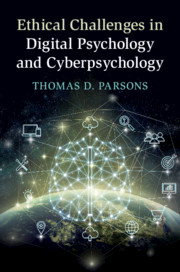Crossref Citations
This Book has been
cited by the following publications. This list is generated based on data provided by Crossref.
Parsons, Thomas
and
Duffield, Tyler
2020.
Paradigm Shift Toward Digital Neuropsychology and High-Dimensional Neuropsychological Assessments: Review.
Journal of Medical Internet Research,
Vol. 22,
Issue. 12,
p.
e23777.
Aymerich-Franch, Laura
and
Fosch-Villaronga, Eduard
2020.
A Self-Guiding Tool to Conduct Research With Embodiment Technologies Responsibly.
Frontiers in Robotics and AI,
Vol. 7,
Issue. ,
Parsons, Thomas D.
Gaggioli, Andrea
and
Riva, Giuseppe
2020.
Extended Reality for the Clinical, Affective, and Social Neurosciences.
Brain Sciences,
Vol. 10,
Issue. 12,
p.
922.
Pickering, Brian
Roth, Silke
and
Webber, Craig
2021.
Researching Cybercrimes.
p.
347.
Parsons, Thomas D.
2021.
Ethics and educational technologies.
Educational Technology Research and Development,
Vol. 69,
Issue. 1,
p.
335.
Pickering, Brian
2021.
Trust, but Verify: Informed Consent, AI Technologies, and Public Health Emergencies.
Future Internet,
Vol. 13,
Issue. 5,
p.
132.
Kisker, Joanna
Lange, Leon
Flinkenflügel, Kira
Kaup, Michael
Labersweiler, Nils
Tetenborg, Falk
Ott, Paula
Gundler, Christopher
Gruber, Thomas
Osinsky, Roman
and
Schöne, Benjamin
2021.
Authentic Fear Responses in Virtual Reality: A Mobile EEG Study on Affective, Behavioral and Electrophysiological Correlates of Fear.
Frontiers in Virtual Reality,
Vol. 2,
Issue. ,
Parsons, Thomas D.
2021.
Ethical Challenges of Using Virtual Environments in the Assessment and Treatment of Psychopathological Disorders.
Journal of Clinical Medicine,
Vol. 10,
Issue. 3,
p.
378.
Bryzgalina, EV
and
Gumarova, AN
2021.
Correlation of neuroethics and bioethics.
Медицинская этика,
Schöne, Benjamin
Kisker, Joanna
Sylvester, Rebecca Sophia
Radtke, Elise Leila
and
Gruber, Thomas
2023.
Library for universal virtual reality experiments (luVRe): A standardized immersive 3D/360° picture and video database for VR based research.
Current Psychology,
Vol. 42,
Issue. 7,
p.
5366.
Stern, Emilie
MICOULAUD FRANCHI, Jean-Arthur
Dumas, Guillaume
Moreira, Jeverson
Mouchabac, Stephane
Maruani, Julia
Philip, Pierre
Lejoyeux, Michel
and
GEOFFROY, Pierre A.
2023.
How Can Digital Mental Health Enhance Psychiatry?.
The Neuroscientist,
Vol. 29,
Issue. 6,
p.
681.
Chochia, Archil
and
Sicat, Eden Grace Niñalga
2023.
Digital Development of the European Union.
p.
129.
D’Amelio, Tomás A.
Bruno, Nicolás M.
Bugnon, Leandro A.
Zamberlan, Federico
and
Tagliazucchi, Enzo
2023.
Affective Computing as a Tool for Understanding Emotion Dynamics from Physiology: A Predictive Modeling Study of Arousal and Valence.
p.
1.
Bugajska, Anna
2024.
Post-Apocalyptic Cultures.
p.
97.
Doğanay, Meral
2024.
Ethics, Social Interaction and Cyberpsychology: Directors’ Paradox.
Adam Akademi Sosyal Bilimler Dergisi,
Vol. 14,
Issue. 1,
p.
127.



